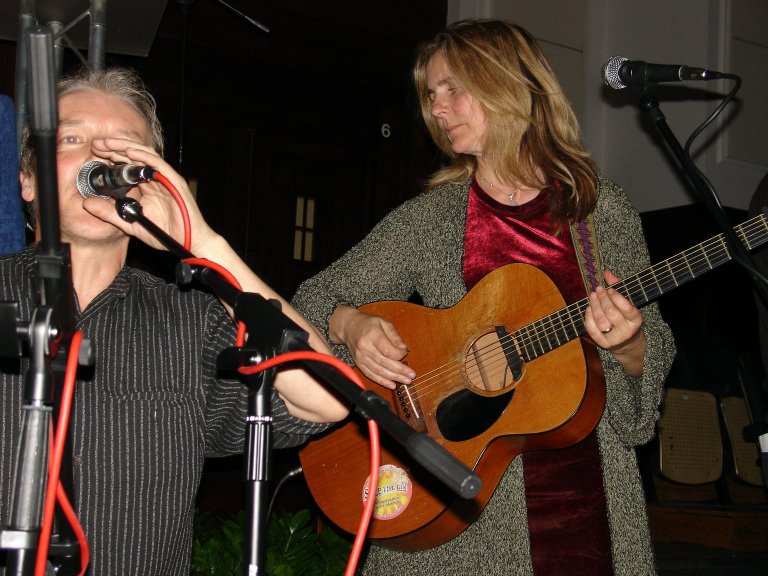Zero Carbon by 2030
Keith Parkins | 31.10.2010 22:57 | Climate Chaos

Bolivian Ambassador Maria de Souviron

delegate engrossed in interesting display

Theo and Shannon - Sieze the Day
 http://www.campaigncc.org/ZeroCby2030
http://www.campaigncc.org/ZeroCby2030  http://keithpp.wordpress.com/2010/10/31/nationwide-shut-down-of-vodafone-stores/
http://keithpp.wordpress.com/2010/10/31/nationwide-shut-down-of-vodafone-stores/ Zero Carbon by 2030 organised by Campaign against Climate Change was a look at how we get to an economy free of carbon by 2030. We have a window of opportunity of five, maybe ten years, before it will be too late. How do we get there?
 http://www.campaigncc.org/
http://www.campaigncc.org/ I missed the introduction on the science, but as I am already very familiar with all the positive feedbacks I probable did not miss anything of importance.
I caught the tail end of Stephen Murphy from Zero Carbon Britain talking about how they intend to get there. From what I heard it sounded very fuzzy and not well thought through. All become veggies and yes we can still fly if we plant lots of crops for biofuels! [see Sustainable Energy]
 http://www.zerocarbonbritain.com/
http://www.zerocarbonbritain.com/  http://www.indymedia.org.uk/en/2008/12/415544.html?c=on
http://www.indymedia.org.uk/en/2008/12/415544.html?c=on Ben Brangwyn talked of Transitions Towns. He gave two examples from opposite ends of the spectrum, Totnes in Devon and Heathrow. How do we oppose a new supermarket? Talk to planners, take direct action or set up an alternative food network so people do not have to go to the supermarket? At Heathrow a derelict site had been brought back into food product and it had brought about community involvement. The police had seen a 50% reduction in crime rate. David 'Big Society' Cameron please note.
 http://transitiontowns.org/
http://transitiontowns.org/ We will have to change to adapt to the future. If we start to change now, future shocks will have less impact, we will be more resilient.
I have mixed feelings re Transitions Towns. Nothing wrong per se, growing local food etc. is all a step in the right direction but does it give a warm cuddly feeling that we have done our bit? Ben Barngwyn admitted the jury was out on this. On the other hand if it makes people more political aware, empowers them, then yes, it is a good direction as nothing is going to happen without direct action, we can forget politicians and big business doing the right thing. [see Transition towns]
 http://www.indymedia.org.uk/en/2008/10/410292.html
http://www.indymedia.org.uk/en/2008/10/410292.html Vicki Hird from FoE talked of the need to restructure agriculture to be less energy intensive. She urged everyone to support the campaign Join the Moovement.
 http://www.jointhemoovement.com/
http://www.jointhemoovement.com/ John Stewart from Airport Watch told us that even for cheap flights, it was the rich that were using the flights not the poor, it was not the myth that is often peddled that is is bringing aviation for all. The rich benefit but it is the poor that suffer, especially the poor in the Third World. We are suffering second-hand noise, second-hand pollution.
 http://www.airportwatch.org.uk/
http://www.airportwatch.org.uk/ Aviation has to pay its way. It is not as easy though as John and others would have us believe to slap on taxes. It is international treaties that give aviation tax exemptions. We can though be creative. Air Passenger Duty is ill-conceived as the airlines simply pass it on to their passengers. It should be a tax per flight. The worst offenders pay the highest tax. This would be a combination of emissions, nuisance loading factors. There is then an incentive to improve.
The most obscene offender by far is the business aviation at Farnborough Airport. Average of 2.5 passengers per plane. A Boeing Business Jet is a re-configured Boeing 737.
Deepak Rughani from Biofuelwatch was a breath of fresh air. He said there was too much focus on carbon and we were ignoring ecosystem destruction. That if we destroyed the Gaian control mechanisms it would make no difference were we to reduce carbon emissions, reduce the amount of carbon in the atmosphere as these targets have no meaning if our Gaian control mechanisms are destroyed.
 http://www.biofuelwatch.org.uk/
http://www.biofuelwatch.org.uk/ Plantations have about 4% the carbon of pristine rain forests. Every time we destroy a living species, we destroy part of the complex web of life with unknown and often unknowable consequences.
Deepak Rughani attacked the presentation earlier suggesting we could reach Zero Carbon Britain by growing crops for aviation fuel! Sadly there are some folk living in cloud cuckoo land. But most of the NGOs are not listening.
There are plans to import wood chips as biofuels. This means forest destruction in Canada and the Third World. We also see human rights abuses associated with the production of biofuels.
Land should be used for Food not Fuel.
There is no such thing as sustainable palm oil production. The land could be used for growing crops or restored to forest.
For years I have been highlighting biofuels is bad. Biowaste yes, but not the growing of crops as fuels. It has to be seen as a sick joke when earlier in the week Rainforest Action Network were promoting sustainable palm oil plantations. But then RAN also supports the logging of primary forests.
Wood burning stoves, associated with traditional coppicing of ancient woodland improves the biodiversity of the woodland. Picking up dead wood from the woodland floor is destroying the lifeforms within the dead wood.
Bolivian Ambassador Maria de Souviron said the poor countries were not going to be bullied into an international agreement that left them worse off. Global temperature rises had to be limited to no more than one degree centigrade. In Bolivia there was a grass roots movement Mother Earth. The Cochabamba Declaration argues for a target of limiting temperature rise to no more than one degree centigrade and a maximum limit of 300 ppm of carbon in the atmosphere.
 http://pwccc.wordpress.com/2010/04/24/peoples-agreement/
http://pwccc.wordpress.com/2010/04/24/peoples-agreement/ Speaking to Maria de Souviron afterwards I asked what brought an ambassador to such an event. She said she was only too happy to lend her support as climate change effected the poorest countries. Some countries would disappear or be devastated by rising sea levels. In Bolivia the glaciers would melt. In the winter they would have floods, in the summer drought.
A trade unionists gave the trade union viewpoint. We could create a million green jobs. But we should not as he asked, stand shoulder-to-shoulder on the picket line with Luddite Trade Unionists to protect jobs in dirty industries, but we will support the workers in the call for the creation of green jobs.
Andrew Simms from The New Economics Foundation spoke of the limits to growth. We live on a finite world with finite resources. We are citizens, not consumers. In one day he counted over 400 adverts calling for us to consume, but only three that asked for good behaviour from us as citizens. The news links High Street spending with the state of the economy. NEF has produced a report The Great Transition.
 http://www.neweconomics.org/
http://www.neweconomics.org/  http://www.neweconomics.org/projects/the-great-transition
http://www.neweconomics.org/projects/the-great-transition Alexis Rowell from Camden CAN and 10 by 10 Campaigning forward told us of what is happening in Camden. Council vehicles powered by fuel from biowaste, education of Camden planning officials on what green means, buildings that recycle grey water, green roofs. In Wales there was initiatives with New Economics Foundation on the use of well-being indices. As a Libdem councillor he was very outspoken against the Libdems in the coalition government.
 http://www.neweconomics.org/programmes/well-being
http://www.neweconomics.org/programmes/well-being Caroline Lucas who had hoped to be there sent her apologies. She was attending a rally on cuts in Brighton.
John McDonnell was due to speak but sent a video message with his apologies.
In the evening we had entertainment. Poetry and music. Songs from Seize the Day. An amazing guy on guitar with another guy on violin. A lovely poem on the earth shedding tears (the words please).
 http://www.heureka.clara.net/music/seizeday.htm
http://www.heureka.clara.net/music/seizeday.htm There was a meet up in a pub the Cock Tavern in Kings Cross later but the map was illegible, many people had gone home.
I called it a day. I had a chat with Shannon, lead singer in Seize the Day, she signed a copy of Standing Strong, only released that day, mine was number five she told me.
Nearby in the back streets at the side of Euston Station are some very good Indian restaurants. I had a dosa, two glasses of water, then caught the overcrowded train home.
There is to be a big (or hoped to be big) march in December I would question the timing and the futility of such a march. Who is wanting to march on a cold December day? What is the purpose of marching on Parliament on a Saturday when no one is there. Lessons are not being learnt. Marches attract zero publicity and do not achieve anything. It is direct action that achieves change, that gets publicity.
 http://www.campaigncc.org/climatemarch2010
http://www.campaigncc.org/climatemarch2010 The suffragettes learnt a hundred years ago that marches gets you nowhere. Change comes through direct action, through confronting those in power, by making the status quo costly.
 http://www.heureka.clara.net/gaia/dir-act.htm
http://www.heureka.clara.net/gaia/dir-act.htm Also see
Gaia's prayer
 http://keithpp.wordpress.com/2010/10/25/gaias-prayer/
http://keithpp.wordpress.com/2010/10/25/gaias-prayer/ Transitions towns
 http://www.indymedia.org.uk/en/2008/10/410292.html
http://www.indymedia.org.uk/en/2008/10/410292.html Nationwide shut down of Vodafone stores
 http://keithpp.wordpress.com/2010/10/31/nationwide-shut-down-of-vodafone-stores/
http://keithpp.wordpress.com/2010/10/31/nationwide-shut-down-of-vodafone-stores/ Funny Weather
 http://www.heureka.clara.net/books/funny-weather.htm
http://www.heureka.clara.net/books/funny-weather.htm Sustainable Energy — without the hot air
 http://www.indymedia.org.uk/en/2008/12/415544.html?c=on
http://www.indymedia.org.uk/en/2008/12/415544.html?c=on Soft Energy Paths
 http://www.heureka.clara.net/gaia/energy.htm
http://www.heureka.clara.net/gaia/energy.htm Curitiba – Designing a sustainable city
 http://www.heureka.clara.net/gaia/curitiba.htm
http://www.heureka.clara.net/gaia/curitiba.htm Natural Capitalism
 http://www.heureka.clara.net/gaia/nat-cap.htm
http://www.heureka.clara.net/gaia/nat-cap.htm
Keith Parkins